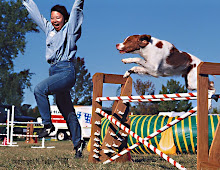[This was originally posted on the Fairmount Animal Hospital website on 14 September 2008]
Dear Dr. Lee,
My friends all say that my Poodle mix, Spike, is a “little monster.” He jumps all over them when they come over, he steals food right off their plates, barks at them when he doesn’t get his way, and sometimes he will even nip them when he is desperate to play. He does these things to me, too, but I guess I don’t mind as much as my friends. How can I get Spike to be better behaved so I can keep my friends?
Mother of a Monster in Marcellus
Dear Mother,
A well-behaved dog is a product of time and effort in training. I suggest you investigate taking an obedience class in your local area, or working with a trainer privately. Without basic training and consistent treatment at home, a dog can become confused about how to ask for food, attention and play, and he may start “demanding” these things in ways that are less than desirable for their human companions (and their friends). Many of these dogs run the households they live in.
One thing that you can do to help your situation is to constantly reinforce your position as a kind, benevolent leader of your “pack.” One of the products of domestication of dogs is the loss of their ability to be an effective leader. That means the humans of the household need to fill in the role of pack leader. How can this be achieved?
The Nothing-In-Life-Is-Free program is a powerful method to help establish the humans as the leaders and deference in the dog. Essentially, for everything that your dog likes, your dog has to sit and look at you for it. Dinner? Sit. Go out? Sit. Come back in? Sit. Treat? Sit. Throw the ball for fetch? Sit. Open the crate door? Sit. Get together with your family and come up with a list of “good things” that your dog enjoys. Do not forget to include attention – which means touching, speaking to, or even looking at your dog. Post the list in a place so everyone can see it and be reminded of what items your dog needs to sit for.
What this program actually achieves is the use of motivating situations (see the list you generated) to ask your dog for deference. Dogs primarily use body language to communicate with each other. A sit with a look to you means that your dog acknowledges your leadership status.
With consistency and time, eventually, your dog may automatically sit when he wants something – and your friends might actually come to enjoy and like Spike.
Sincerely,
Dr. Lee
My primary objective is to help pets and owners enjoy a more satisfying relationship with each other and maintaining the pet’s health to maintain the pet’s quality of life. Pets have the ability to enrich our lives immensely, and I feel that owners also have a responsibility to enrich their pets’ lives, too.
Got a pet behavior question?
E-mail me at fah@fairmountanimal.com.
